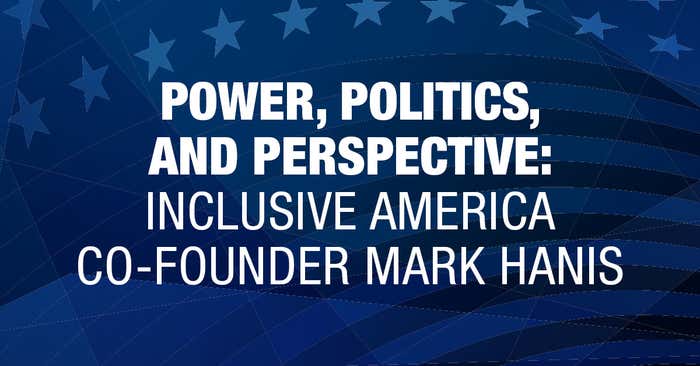
As a lead-up to the 2020 presidential election, MoFo welcomed co-founder of Inclusive America and research fellow with Stanford University’s Center for Human Rights and International Justice Mark Hanis to a virtual discussion hosted by the firm’s Diversity Strategy Committee. This panel was the first in a three-part series called “Power, Politics, and Perspective.”
The discussion was moderated by New York Litigation partner Haima Marlier, who, like Mark, comes from a government background and served as senior trial counsel for the Securities & Exchange Commission prior to joining MoFo. After introducing Mark, she asked him about the founding of Inclusive America and its approach to diversifying government by tracking demographic information of all political positions, analyzing that data, and elevating qualified, diverse candidates for various positions.
Mark was working in the office of then Vice President Joe Biden as the National Security Affairs Special Advisor for South America, Africa, and Human Rights when he got the idea to create a more diverse executive branch. Mark stated, “We felt that there was this huge gap in trying to make sure that the largest employer in the public sector stood true to its promise that the government would be of, by, and for the people.”
MoFo teamed up with Mark and Inclusive America to tackle the issue of racial disparities in the executive branch of the U.S. government, using a three-pronged strategy. The first step was to diagnose the problem. MoFo helped submit multiple requests to the office of personnel management of the federal government seeking information for every person politically appointed by the president of the United States.
This amounts to nearly 30,000 people who the team will categorize based on seven traits—age, gender, race, sexual orientation, disability, religion, and veteran status—to gauge the current level of inclusivity. They are about three quarters of the way through this portion of the project, but it’s already clear that the majority of positions have historically been held by white men.
One key finding was that the government has never appointed a woman to three major cabinet positions—secretary of defense, secretary of veterans affairs, and secretary of the treasury—nor has there been a woman selected as a U.S. ambassador to America’s key allies or geographical rivals. Additionally, in the last 20 years there have been no African Americans appointed to any of the five positions under the secretary of state position and only one Native American has served at the rank of ambassador.
The second step of the three-pronged approach is how to fix these discrepancies. Mark is spearheading an effort to amass a coalition of over 100 groups and build a database of underrepresented individuals who are interested and qualified to serve in some 5,000 positions that could be filled by the next administration.
The third and final prong is taking a closer look at systemic and structural changes. Inclusive America is looking to the nonprofit and private sector for best practices when it comes to creating a more inclusive workplace through policies such as pay equity, parental leave, child care, paid internships, and unconscious bias training. Its findings and recommendations will be part of an Executive Order that it hopes will be signed and adopted by the next administration.
MoFo also advised Inclusive America on the creation of a website, calling on our nation’s leaders and current political candidates to take the “Pledge for Diversity, Equity, and Inclusion” and ensure that everyone has a seat at the table. The pledge is an adaptation of Diversity Lab’s Mansfield Rule, which asks law firms and public organizations to commit to considering a larger percentage of diverse candidates for leadership positions. MoFo was one of 25 firms that received Mansfield Certification Plus status for three consecutive years, recognizing that we successfully reached at least 30 percent women, communities of color, and LGBTQ+ lawyer representation in a notable number of current leadership roles and committees.
Haima also asked Mark how his background, as the grandchild of four Holocaust survivors, and being raised in Ecuador has impacted his decision to help found Inclusive America. “Hearing about the Holocaust and the lessons about how never again should we allow anyone to be targeted for who they are … That made me very aware of being insensitive to other underrepresented groups,” recalled Mark.
During his time at Swarthmore College, Mark founded United to End Genocide to empower citizens and communities with the tools to prevent and stop genocide, of which MoFo partner Brad Wine joined the board of directors. This set the stage for Mark to broaden his advocacy efforts to help other underrepresented groups and establish several social impact organizations, including the Beeck Center for Social Impact & Innovation at Georgetown University to engage global leaders to drive social change at scale and the Organ Alliance (now Organize) to address the unnecessary deaths due to a shortage of transplantable organs.
Listen to more topics discussed during this presentation in the video clips below:
THE FOUNDING PURPOSE BEHIND INCLUSIVE AMERICA
KEY FINDINGS ON CURRENTLY UNDERREPRESENTED POSITIONS IN GOVERNMENT
HOW THE RESULTS OF THE ELECTION MIGHT AFFECT HIRING